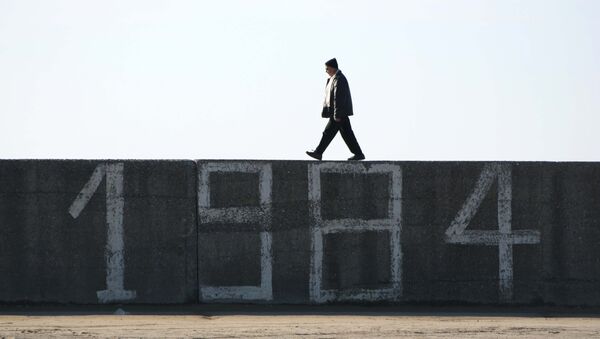The exchange quickly became infamous: on NBC's Sunday show "Meet the Press," host Chuck Todd interviewed Counselor to the President Kellyanne Conway about her colleague, White House Press Secretary Sean Spicer, who offered "provable falsehoods" during his very first meeting with the press: namely, the size of the crowd that watched President Trump's inauguration.
After some arguing, Conway said: "You're saying it's a falsehood… Sean Spicer, our press secretary, gave alternative facts to that."
"Wait a minute," said Todd with an incredulous chuckle. "Alternative facts? Alternative facts?… Alternative facts are not facts. They're falsehoods."
Conway's comment was widely derided by Trump opponents, and many claimed that the phrase "alternative facts" sounded like a comment from the oppressive police state known as Big Brother in Orwell's famous novel.
That novel contains the line, "The party told you to reject the evidence of your eyes and ears. It was their final, most essential command." Many compared this to Spicer"s comments about the inauguration, despite photographs clearly demonstrating fewer attendees to Trump's inauguration than to Obama's eight years prior.
In 1984, society is controlled by a totalitarian government that watches nearly every aspect of human life. The main character, Winston Smith, is a minor bureaucrat with the Ministry of Truth whose job is to rewrite historical events to fit Big Brother's version of events, including erasing all evidence that certain people ever existed.
A major theme of the novel is Big Brother's manipulation of the truth to better suit the policies of the authoritarian state. Facts and reality are irrelevant, and only what Big Brother says is true matters. The novel coins many terms to describe this behavior, including "goodthink" (thought approved by Big Brother), and its opposite, "thoughtcrime."
Orwell, a democratic socialist, was distressed by atrocities committed by both Hitler's Germany and Stalin's Soviet Union, and believed the western world was beginning to move down a similar path. Orwell died shortly after the book's publication. 1984 is frequently read in the west by high school students, making it one of the most popular novels of the 20th century.
Spikes in 1984's popularity often follow moments of distrust in the government. Sales increased significantly following the 2013 leak of NSA documents from Edward Snowden and others.
In the west, it has become common to compare governments the author dislikes to Orwell's worst-case-scenario. A 2014 Forbes story had the headline, "Obama's Corruption of the English Language Comes Right From Orwell's '1984.'" A 2002 article from SFGate was entitled "Learning to love Big Brother / George W. Bush channels George Orwell."




